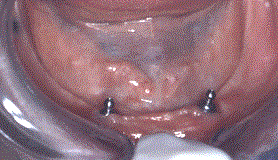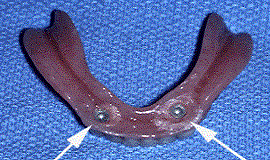Synopsis of Implant Indications and Treatment Planning
The emergence of the endosseous dental implants as a predictable and accepted part of patient care has allowed the practitioner to achieve excellent results in previously difficult or impossible prosthetic cases, such as:
Single tooth replacement
Implant use is often motivated by a desire to avoid unnecessary reduction of healthy enamel on virgin or minimally restored teeth. This is often the case in tooth loss due to:
- Vertical root fracture with healthy adjacent teeth
- Traumatic tooth loss
- Congenitally missing teeth. Excellent esthetics are achievable with anterior implants.
- Questionable abutment teeth do not need to be relied upon to support a prosthesis if implants are used.
- Longer span edentulous spaces
Implants can be used to avoid unfavorable prosthodontic mechanics such as distal extension partials. Removable teeth are also equated with old age by patients of all ages. - Edentulous arch
Ridge atrophy and/or high muscle attachments that prevent adequate denture stability can be counteracted with implants to greatly improve function and patient satisfaction
Contraindications to implant placement (most are relative and may reduce the predictability of success, but may still leave implants as the best treatment for the circumstances)
Poor oral hygiene and motivation to maintain dentition and/or clean implants
Smoking
Bruxism
Medical problems
Inadequate bone mass or density (can usually be augmented with bone grafting and/or guided tissue regeneration).
Adjacent anatomical structures (nerve or sinus) can usually be worked around with bone grafting and/or guided tissue regeneration.
Short implants have eliminated need for pre-implant grafting in many, many instances. Implants are a predictable and successful way to replace missing teeth. There is good agreement that if an implant is feasible it is usually the best and longest-lasting treatment. An implant should be considered every time that you replace a tooth. If an implant is your best treatment for a given clinical situation, it should be presented as such to the patient so that an informed decision can be made. Focus on the ultimate benefits of the treatment result. Consumer awareness has made implants an expected and desirable treatment option. They predictably represent the best that you and dentistry can offer your patients to replace teeth.


O-ring attachments to secure manibular full denture.
